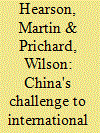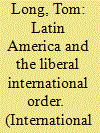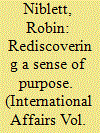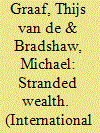|
|
|
Sort Order |
|
|
|
Items / Page
|
|
|
|
|
|
|
| Srl | Item |
| 1 |
ID:
163266


|
|
|
|
|
| Summary/Abstract |
In November 2010, the then British Foreign Secretary William Hague delivered Canning House's annual lecture on the topic of Britain's relations with Latin America. In launching the so-called ‘Canning Agenda’, Hague pledged to ‘halt the decline in Britain's diplomatic presence in Latin America’. ‘It is now time’, Hague went on, ‘for an advance to begin’. This article represents the first scholarly analysis of this policy. In particular, it assesses British efforts to enhance its economic ties with the countries of Latin America; the status granted to Latin America in Britain's strategic world-view in the post-Brexit era; the impact on Britain of other external powers in the region; and the political relationships between Britain and the countries of Latin America. The article draws on interviews with the key policy-makers involved in the Canning Agenda, including William Hague, Sir Hugo Swire, Jeremy Browne, and several other officials and diplomats from Britain and throughout Latin America. It concludes that while an identifiable effort to enhance Britain's economic and political standing in Latin America is discernible since 2010, major impediments to achieving this goal persist across the range of areas explored.
|
|
|
|
|
|
|
|
|
|
|
|
|
|
|
|
| 2 |
ID:
163261


|
|
|
|
|
| Summary/Abstract |
Twentieth century institutions of global economic governance face a profound challenge adapting to the rise of emerging markets and, especially, China's rise. This is especially the case for the international tax regime, whose institutional home is the OECD and which is based on norms that favour capital exporting states. To understand the nature of the challenge posed by China, we focus on the country's engagement with a foundational norm of the international tax regime: the arm's length principle. We show that China's approach to tax cooperation is characterized by a set of apparent contradictions: conciliatory language hides an assault on the arm's length principle; a rhetoric of common cause with developing countries is contradicted by actions that maximize only China's own share of the tax ‘pie’; and a willingness to court the OECD based on the leverage gained from flirtation with outside options. In these respects, China increasingly appears to be using its market power to seek special privileges within international regimes, in ways that mirror the historical actions of the United States
|
|
|
|
|
|
|
|
|
|
|
|
|
|
|
|
| 3 |
ID:
163257


|
|
|
|
|
| Summary/Abstract |
Chinese leaders are increasingly mobilizing historical narratives as part of a broader trend that challenges Francis Fukuyama's thesis of the end of history. China's monumental history as an ancient civilization is used to revise the communist party's ideology and to buttress foreign policy ambitions and infrastructural investments—including the ‘belt and road initiative’ and territorial claims in the South China Sea. This more assertive approach to China's immediate neighbourhood resonates with the official reiteration of imperial tropes and concepts of Confucian philosophy, yet assertions that Beijing wants to reanimate the tribute system remain contested. While using historical narratives to legitimize foreign policy is not new, we are witnessing an unprecedented ‘return of history’ as a global social force. By revisiting Fukuyama's claims, I develop the notion of ‘historical statecraft’ and apply it to China's ‘belt and road initiative’. The Chinese case is exemplary for the importance of ideational factors in understanding the recent structural changes often described as the weakening of the West. This article examines in what ways China's historical statecraft is challenging western narratives, what controversies emerge as China articulates its identity as a re-emerging ancient Great Power—one which expects global audiences to acknowledge the value of its cultural norms—and whether the Chinese approach to the use of the past for construing alternative political imaginaries contributes to a peaceful reconstruction of global order.
|
|
|
|
|
|
|
|
|
|
|
|
|
|
|
|
| 4 |
ID:
163264


|
|
|
|
|
| Summary/Abstract |
European Union member states have been notoriously divided in their attitudes towards Russia. These national positions have, however, too often been essentialized, thereby obfuscating nuances and foregoing the possibility to discern or explain change. Considering its strong political and economic links with Russia, its past positions and the fact that Ukraine had never registered prominently on its foreign policy radar, France's reaction to the Ukraine crisis has been firmer and more active than most could have forecast. This article examines the content, determinants and evolutions of France's policies towards Russia before, during and beyond the crisis. Contrary to traditional explanations, which tend to emphasize historic, cultural, economic or domestic political factors, I argue that these policies have been mainly—and continuously—driven by France's broader milieu goals in international and European politics. These considerations help to account for the policy shift revealed during the Ukraine crisis. Following the emergence of Russia as a central actor in Syria and the correlated politicization of the Russia question in the 2017 French presidential election, the Macron administration has adopted a new diplomatic approach towards Moscow. Yet a different policy direction has not emerged, as the administration has not fundamentally put into question the previously established assessment of how Russia's current foreign policy collides with France's milieu goals.
|
|
|
|
|
|
|
|
|
|
|
|
|
|
|
|
| 5 |
ID:
163258


|
|
|
|
|
| Summary/Abstract |
Iran has steadily expanded its strategic influence across the Middle East in large part due to its cultivation of a network of foreign co-religionist militant clients. Those clients have enabled Iran to fight adversaries by proxy in Iraq, Syria and Yemen. Iran's growing regional influence is often credited to the shared religious ties and loyalties of its clients. This article challenges that notion by examining Iran's post-1979 track record of developing clients and argues that, although Iran's successes—such as Lebanon's Hezbollah and Iraq's Badr—are well known, its failures to develop or retain the loyalty of clients have received much less attention. This article finds that Iran's relations with its clients are strongest when three conditions exist: first, those clients share Iran's theocratic interpretation of Shi'a Islam; second, Iran is the sole patron or the leading outside source of support to the client; and third, the client either shares or does not oppose Iran's ambitions in its country and agenda in the region. In cases when all those factors are present, Iran has been successful at preserving strong ties with clients over time. However, if one of those conditions is absent, then Iran's ties to a client can be susceptible to weakening and outside competition. These findings have important implications for the future of Iranian influence in the region and the Middle East more broadly.
|
|
|
|
|
|
|
|
|
|
|
|
|
|
|
|
| 6 |
ID:
163265


|
|
|
|
|
| Summary/Abstract |
Recent debates about challenges to the liberal international order (LIO) have led International Relations (IR) scholars, both those critical and supportive of the concept, to examine its origins and effects. While this work has shed new light on the evolution of international order, there has been a surprising absence: Latin America. I explore the theoretical consequences of this empirical gap for IR's understanding of the liberal international order. After assessing the literature's treatment of Latin American and the LIO, I offer a macro-historical sketch of the region's role in the order's critical junctures. The LIO has shaped Latin America, and Latin America has shaped the LIO—but not always in the ways supporters or critics might expect. The region's sovereignty and statehood evolved alongside the LIO—with international experiences very different from those of areas colonized during the LIO's expansion—and, in turn, Latin American engagement shaped the practices of Great Powers through international law and organization, cooperation and resistance. Despite its participation in the LIO's founding moments, Latin America was often accorded second-class treatment and benefits for the region have often been narrow. The experience of Latin American states over two centuries—independent but often internationally unequal—highlights the consequences of partial inclusion or marginalization from the LIO. Deeper study of Latin America's history with the LIO casts light on the ways in which non-Great Powers outside the order's core shaped, and were shaped by, the elements of the evolving order.
|
|
|
|
|
|
|
|
|
|
|
|
|
|
|
|
| 7 |
ID:
163263


|
|
|
|
|
| Summary/Abstract |
The ‘local turn’ in peacebuilding has been inspired by the idea that post-conflict order is made more just, representative and legitimate when there is greater recognition and incorporation of local sites of authority. However, the gendered visions of security that may be projected from these spheres have often escaped critical attention. This oversight continues despite growing feminist interest in understanding both the contributions that women can make to the durability of conflict settlement processes and the obstacles that often prevent those contributions from progressing. In this article, I examine the frictional encounters that occur between the local and the liberal in peacebuilding and focus particularly on what this means for women. I argue that a focus on vernacular security provides a productive analytical lens for answering this question and for building understanding of where and how women are advantaged and disadvantaged by projects of post-conflict transition. My findings demonstrate how the security vernaculars that are generated in liberal–local peacebuilding produce scenarios that are often contradictory for women and can be enabling and constraining in different contexts. The discussion draws from recent research findings on the gendered impacts of peacebuilding and post-conflict restoration in Bougainville, an autonomous territory of Papua New Guinea, and Solomon Islands.
|
|
|
|
|
|
|
|
|
|
|
|
|
|
|
|
| 8 |
ID:
163259


|
|
|
|
|
| Summary/Abstract |
The representation of women as agents of violence matters. Scholars have shown those representations to be gendered and racially biased in a wide variety of contexts. So far, though, International Relations scholars have neglected a major part of women's violence in the global arena: women's involvement in organized crime. Scholars might neglect transnational criminal organizations (TNCOs) because in many cases they do not have an explicit political purpose, as do other organizations of extra-legal violence (such as militias, paramilitaries and/or terrorist organizations). This simple reading neglects the ways in which TNCOs influence state policies, engage with the creation of international norms and participate in (or contravene) the diffusion of international norms into domestic practices. This article makes the dual move, then, of taking TNCOs seriously as actors in global politics, and of taking women seriously as members and leaders of TNCOs. It does pay attention to how they are represented. But more than that, it explores their lives and the contexts in which they live or have lived. Rather than telling a story of female victimhood, this article tells a story of female agency. It concludes by arguing that seeing politically violent women as agents is not enough, nor is understanding the gendered context in which they live. Instead, politically violent women must be understood within gendered contexts. Analysis of female members of TNCOs both shows the unique features of TNCOs and provides a broader applicability for understandings of gender and of violence in the global political arena.
|
|
|
|
|
|
|
|
|
|
|
|
|
|
|
|
| 9 |
ID:
163260


|
|
|
|
|
| Summary/Abstract |
This article suggests that a powerful defence for open trade can be derived from offensive realism. Offensive realists posit that a state tries to maximize its relative material power in order to protect its security in the dangerous international realm. I argue that with regard to trade, relative power maximizing states have strong incentives to maintain free trade. Mainstream trade theories commonly suggest that an important mechanism through which trade affects a state's material capacity is specialization, which advances trading states' allocative and productive efficiency. When specialization is prioritized, the international trade structure is likely to be composed of multiple players, or be ‘multipolar’, and protectionist states are likely to encounter significant relative losses vis-à-vis other states. In the multipolar trade structure, even when a state is facing relative losses from existing commercial exchanges, employing extensive protectionist policies would weaken the state's relative power as it would incur even larger relative losses. In the offensive realist world where the failure to maximize relative power is dangerous, protectionism needs to be avoided precisely because it does not allow for power maximization. This argument is substantiated by an examination of the United Kingdom's decision to avoid protectionism during the decades leading up to First World War.
|
|
|
|
|
|
|
|
|
|
|
|
|
|
|
|
| 10 |
ID:
163267


|
|
|
|
|
| Summary/Abstract |
A series of centenary anniversaries for some of the original think-tanks, as well as increasing turbulence in domestic and international affairs, makes this a propitious time to review the role of think-tanks in helping to build a sustainably secure, prosperous and just world. Today, western think-tanks, in particular, face a number of challenges to their relevance and credibility. It remains to be seen whether they can rediscover a sense of purpose that is fit for the twenty-first century, at a time when the pillars of the western-led international order that mobilized their counterparts early in the twentieth century are eroding. To do so, I propose five practical steps that all think-tanks can take to adapt to these demands and challenges. I also suggest a set of principles that both western think-tanks and their counterparts in other parts of the world should commit to if they want to work together to promote the sort of peaceful and cooperative world that lies at the core of their stated missions. At heart, leading think-tanks must consider whether it suffices to try to remain sources of objective debate and analysis, or if it is time, once again, for them to adopt a more proactive stance, being explicit about the principles that they believe should underpin peace and prosperity. If independent think-tanks work together around converging principles, then they can contribute to the emergence for the first time of an inclusive international society and thus confirm their normative as well as practical value.
|
|
|
|
|
|
|
|
|
|
|
|
|
|
|
|
| 11 |
ID:
163262


|
|
|
|
|
| Summary/Abstract |
This article argues that the oil industry is unlikely to return to the pre-2014 status quo as two profound shifts in technology and markets are dramatically changing the longer-term outlook for the oil industry. In the short term, traditional producers will feel persistent pressure from the shale revolution, a disruptive technology that has altered the cost curve and elasticity of oil supply. In the medium term, the industry must confront a structural slowdown and eventual peak in demand owing to innovation and evolving consumer preferences, related in part to concerns over climate change. Together, these shifts reflect a new energy order in which oil is no longer an exhaustible resource, new trading patterns emerge and oil prices exhibit greater short-term volatility amid a long-term declining trend. These new rules of the game force us to reconsider some of the theories and concepts of the international political economy of oil. We flag three key political effects from these market shifts: first, key oil-producing states face economic and political turmoil; second, OPEC cannot influence the price of oil in the long term by cutting output; and third, power is redistributed in the international system.
|
|
|
|
|
|
|
|
|
|
|
|
|
|
|
|
| 12 |
ID:
163268


|
|
|
|
|
| Summary/Abstract |
When commentators look back on the state of trust in contemporary world politics, the words of Charles Dickens in A tale of two cities will seem sadly appropriate: ‘It was the best of times, it was the worst of times, it was the age of wisdom, it was the age of foolishness, it was the epoch of belief, it was the epoch of incredulity, it was the season of light, it was the season of darkness’. On the one hand, the president of the world's supposedly leading liberal democracy is given to emotional declarations of trust in some of the world's least trustworthy autocrats, with Russian President Vladimir Putin and North Korean leader...
|
|
|
|
|
|
|
|
|
|
|
|
|
|
|
|
|
|
|
|
|